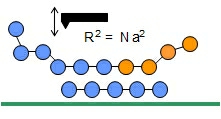Thesis Projects (Bachelor/Master/Doctoral)
What is Polymer physics?
Polymers or chain molecules are very versatile materials. Their special mechanical, optical or electrical properties are at the basis of many different applications, in which we encounter polymers in daily life. Also biological matter consists to a large part of polymers. Due to their macromolecular character, polymers display a number of typical and special properties like e.g. viscoelasticity, rubber elasticity, semicrystallinity. Also self assembly is a common feature.
In the framework of our current research projects we offer Bachelor and Master projects in the following research fields:
Crystallization and Molecular Dynamics of Polymers
The polymers PE (Polyethylene) and PET (Polyethyleneterephtalate) are part of our everyday life. They are highly used in industry for the production of plastic bottles and foils etc.. An increasing interest can be also seen for biodegradable polymers like PVL (Polyvalerolactone) und PPS (Polypropylene succinate). In everyday life polymers are typically in a semicrystalline (partial crystalline) status. Depending on their exact characteristics they show very different mechanical properties. To influence these in a systematic way, a deep understanding of the crystallization process is required. Aim of the project would be the investigation and comparison of the crystallization process for the exemplary listed polymers.
Depending on personal interest the project could methodologically start with small angle X-ray scattering (SAXS) or Dynamic Scanning Calorimetry (DSC) and Fast Scanning Calorimetry (FSC). In an adequate time frame, like for a master thesis, also a combination of different methods would be possible.
Interface-Induced Crystallization
Surface-induced crystallization of liquids is an ubiquitous phenomenon in nature and plays an important role in many processes ranging from fundamental questions as ice formation to fabrication of highly oriented thin films of functional materials. In general, a solid surface can induce crystallization by either heterogeneous nucleation or prefreezing, whereas these two processes are very different from a thermodynamic point of view. While heterogeneous nucleation is a non-equilibrium process taking place below the bulk melting point Tm, prefreezing is an equilibrium phenomenon that occurs above Tm. Our aim in this project is to understand how the molecular weight of polymers affects their structure in thin films prefrozen on solid substrates. To tackle this question, a combination of in situ temperature-dependent atomic force microscopy (AFM) and wide-angle X-ray scattering (WAXS) will be used.
Molecular Orientation in Thin Films of Semiconducting Polymers
Semicrystalline conjugated polymers attract great attention as organic materials for various electronic devices due to a striking combination of semiconducting, thermal, solution, and mechanical properties. In particular, semiconducting polymers are promising candidates for organic photovoltaics applications. The charge transport properties of semicrystalline conjugated polymers are anisotropic and depend strongly on the morphology and orientation of polymer crystals. In our group, we study the molecular orientation in thin films of semiconducting polymers deposited on solid substrates. The goal of this project is to understand how the model semiconducting polymers orient on silicon. As a main experimental method, grazing incidence wide-angle X-ray scattering (GIWAXS) will be utilized. In an adequate time frame, like for a master thesis, also a combination of different methods would be possible.
Please contact Prof. Thurn-Albrecht for further information:
thomas.thurn-albrecht@physik.uni-halle.de
Current topics for Bachelor's and Master's theses can be found in StudIp in the corresponding courses.


